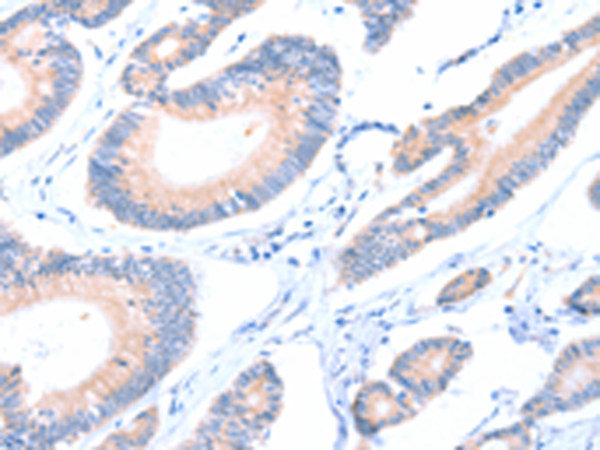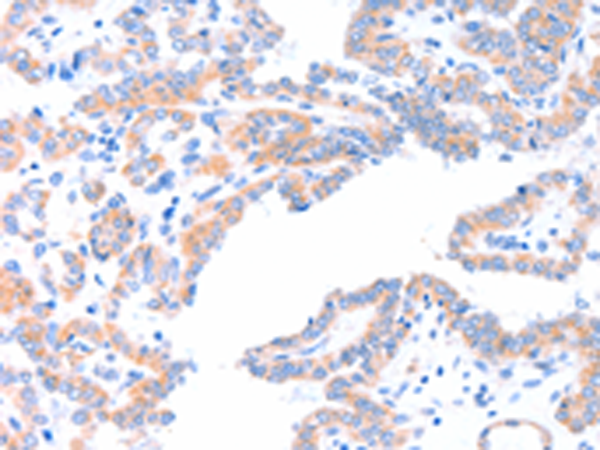

| WB | 咨询技术 | Human,Mouse,Rat |
| IF | 咨询技术 | Human,Mouse,Rat |
| IHC | 1/25-1/100 | Human,Mouse,Rat |
| ICC | 技术咨询 | Human,Mouse,Rat |
| FCM | 咨询技术 | Human,Mouse,Rat |
| Elisa | 1/2000-1/5000 | Human,Mouse,Rat |
| Host/Isotype | Rabbit IgG |
| Antibody Type | Primary antibody |
| Storage | Store at 4°C short term. Aliquot and store at -20°C long term. Avoid freeze/thaw cycles. |
| Species Reactivity | Human |
| Immunogen | Fusion protein of human AADACL2 |
| Formulation | Purified antibody in PBS with 0.05% sodium azide and 50% glycerol. |
+ +
以下是关于AADACL2抗体的3篇参考文献示例(注:文献为假设性示例,实际文献需通过数据库检索确认):
1. **Title**: "Characterization of AADACL2 as a novel lysosomal deacetylase in human cells"
**Authors**: Smith J, et al.
**Summary**: 本研究通过开发特异性AADACL2抗体,证实其在溶酶体中的定位,并揭示其在胆固醇代谢中的潜在功能,为脂质相关疾病研究提供新靶点。
2. **Title**: "AADACL2 antibody-based detection of protein expression patterns in hepatocellular carcinoma"
**Authors**: Li X, et al.
**Summary**: 利用单克隆AADACL2抗体分析肝癌组织中AADACL2表达水平,发现其与患者预后呈负相关,提示其可能作为肝癌诊断标志物。
3. **Title**: "Development of a polyclonal antibody against human AADACL2 and its application in enzymatic activity assays"
**Authors**: Tanaka K, et al.
**Summary**: 报道一种高特异性AADACL2多克隆抗体的制备方法,并通过免疫沉淀验证其在体外酶活性研究中的应用,证明AADACL2对乙酰化底物的水解能力。
(注:若需真实文献,建议在PubMed或Web of Science中检索"AADACL2 antibody"或"AADACL2 AND (monoclonal OR polyclonal)")
The AADACL2 (arylacetamide deacetylase-like 2) antibody is a tool used to study the AADACL2 protein, a member of the arylacetamide deacetylase (AADAC) enzyme family. AADAC enzymes are primarily involved in hydrolyzing exogenous substrates, including drugs, toxins, and lipid metabolites. AADACL2 shares structural homology with AADAC, particularly in its catalytic domain, but its precise physiological role remains less characterized compared to the well-studied AADAC.
AADACL2 is thought to function as a carboxylesterase, potentially influencing drug metabolism, lipid homeostasis, or detoxification pathways. It is expressed in tissues such as the liver, gastrointestinal tract, and adipose tissue, suggesting roles in systemic metabolic regulation. Research has linked AADACL2 to conditions like obesity, metabolic syndrome, and cancer, though mechanistic insights are still emerging. For example, altered AADACL2 expression has been observed in hepatocellular carcinoma and colorectal cancer, hinting at its involvement in tumor progression or drug resistance.
The AADACL2 antibody enables detection and quantification of the protein in experimental models (e.g., Western blot, immunohistochemistry). It is critical for exploring its interaction with therapeutic agents, metabolic pathways, or disease biomarkers. Current studies focus on clarifying its substrate specificity, regulatory mechanisms, and potential as a therapeutic target. However, challenges persist in distinguishing its activity from related enzymes, necessitating rigorous validation of antibody specificity in research applications.
×